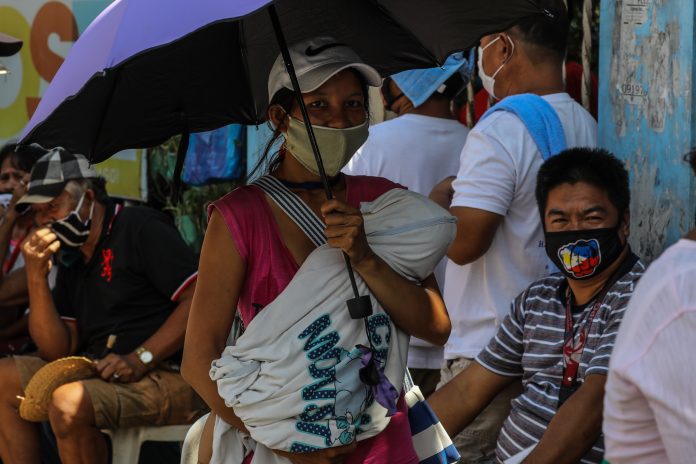It was bad enough that even before COVID-19, Filipinos experiencing hunger and poverty were already too many to be ignored.
Now, with coronavirus cases in the Philippines likely to go beyond the current 15,000 even after a lockdown of two-and-a-half months, hunger and poverty levels are definitely on the upswing.
The number of Filipino families who experienced hunger nearly doubled in the first quarter of this year, according to the latest Social Weather Stations survey.
Hunger incidence began to increase in mid-March as lockdowns and travel restrictions were implemented across the country to stem the spread of the contagion. The quarantine effectively halted business and commerce, affecting millions of workers, especially those from small and medium enterprises.
The survey of 4,010 working-age Filipinos showed that 16.7 percent, or around 4.2 million nationwide, experienced hunger due to lack of food to eat at least once in the past three months.
The latest figure is nearly double the 8.8 percent or around 2.1 million families reported in December 2019. This was also the highest hunger rate since the 22 percent or around 4.8 million families registered in September 2014.
The hunger rate in Metro Manila—epicenter of the coronavirus outbreak—sharply rose to 20.8 percent or 693,000 families in May from 9.3 percent or 307,000 families.

The SWS survey showed that hunger was higher among those with less formal education: 21.1 percent among non-elementary graduates and 24.4 percent among elementary graduates, compared to 16.5 percent among high school graduates and 6.9 among college graduates.
The news of rising incidence of hunger in the Philippines comes close on the heels of the latest report from the National Economic and Development Authority (Neda) that the economy lost an estimated P1.1 trillion in the agriculture, industry and services sectors during the first 45 days of the lockdown.
The losses, equivalent to 5.6 percent of gross domestic product (GDP), were most felt in the National Capital Region (NCR), the country’s services hub, as well as in the Calabarzon region where industrial activity stopped when enhanced community quarantine (ECQ) was imposed in Luzon and other parts of the country since mid-March to contain the spread of the coronavirus.
Neda estimates showed that during the 45-day ECQ, the country’s agriculture sector incurred P94.3 million in losses; the industry sector, P537.7 billion; and services, P589.7 billion.
In Metro Manila, the country’s political and business center—economic losses amounted to P589.3 billion, with the biggest chunk of foregone revenues coming from the services sector at P454.8 billion.
Amid the rising incidence of hunger and the loss of jobs and livelihood in the country resulting from COVID-19, the Church in the Philippines has mobilized its nationwide machinery to help the poor and the disadvantaged sectors in society.
Its assistance to the poor has taken various forms: distribution of food packs and hygiene kits to marginalized communities; opening up church facilities to give temporary shelter to the homeless; organizing fund-raising activities on its own or in partnership with civil society groups to fund its pro-poor initiatives; and urging government to provide urgent cash assistance to those without the means to survive the public health-cum-economic crisis.
The Church response to the COVID-19 crisis is consistent with its stand on helping the poor. Years back, in a paper titled “Economic Justice for All”, Catholic bishops in the United States pointed out: “Jesus takes the side of those most in need. As followers of Christ, we are challenged to make a fundamental ‘option for the poor’—to speak for the voiceless, to defend the defenseless, to assess life styles, policies, and social institutions in terms of their impact on the poor. ”

More recently, Pope Francis also spoke along these lines: “Each individual Christian and every community is called to be an instrument of God for the liberation and promotion of the poor, and for enabling them to be fully a part of society. This demands that we be attentive to the cry of the poor and to come to their aid.”
Further on, the Pontiff explained, the Church must work “to eliminate the structural causes of poverty and to promote the integral development of the poor, as well as small daily acts of solidarity in meeting their real needs…The dignity of each human person and the pursuit of the common good are concerns which ought to shape all economic policies.”
As its response to the COVID-19 has amply demonstrated, the Church in the Philippines has firmly adhered to its commitment to help uplift the quality of life of poor Filipinos. Its work, however, is far from finished, particularly if generational poverty will continue to hound Filipinos in both city and countryside. Economic justice for all may be difficult to achieve, but it’s a goal that should be pursued with all the resources we can muster.
Ernesto M. Hilario writes on political and social justice issues for various publications in the Philippines. The views and opinions expressed in this article are those of the author and do not necessarily reflect the official editorial position of LiCAS.news.









